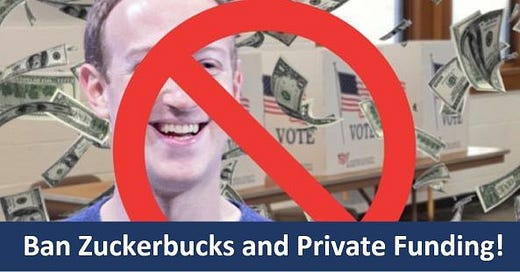THIS WEEK. In the wake of recent revelations surrounding private funding, notably 'Zuckerbucks,' influencing election outcomes, the integrity of our election process is facing scrutiny.
Private donations, such as those made by Meta founder Mark Zuckerberg, have raised concerns among lawmakers. Critics argue that these funds were strategically deployed to mobilize Democratic voters in swing states during the 2020 general election, raising questions about the fairness and impartiality of the electoral process.
During the House Administration Committee hearing, Republicans argued that large donations, under the guise of supporting poll-worker training and expanding mail-in voting during the COVID-19 pandemic, were disproportionately directed towards Democratic-leaning districts. The focus on transparent and publicly funded elections gained momentum as lawmakers sought to restore confidence in the electoral system.
Democrats concurred with their Republican colleagues on the need for publicly funded elections. However, they criticized the specific focus on private funders, arguing that it diverted attention from the broader goal of aiding underfunded local election administrations.
Democratic members, like Rep. Terri Sewell, stressed the importance of public funding for elections, asserting that the unrelenting focus on private funders undermines the common goal of ensuring fair and accessible elections.
Beyond the debate on private funding, the spotlight on election funding brings attention to the systemic issue of underfunded local election administrations. With over 8,000 local election jurisdictions in the United States, the collective cost to operate is estimated to be $2 billion, according to research from the University of Kansas. The current funding model, relying on local sources, leaves these administrations grappling with financial constraints.
Zachary Mohr, associate professor at the University of Kansas, emphasized the critical need for federal intervention. As states consider banning private funding, the lack of adequate resources for election administration becomes even more glaring.
As expected, the discussion morphed into a bait and switch, blurring the lines between the costs of getting out the vote and the cost of election administration. Taxpayers must never be required to fund a bucket for candidates to run for office, nor should it be funding voter registration and get-out-the-vote activities, which is what got us into trouble to begin with.
68 Election Reform Bills Passed in 30 States this 2021-2022 Session!
$2 Billion Leftist Movement Organizing One-Party Takeover in Arizona!
Act for America Has Been Advocating to Ban Zuckerbucks and All Private Funding of Elections since 2022! You are making a difference!
Ban Zuckerbucks and Private Funding of Elections Campaign. 1.4+ million actions.
Passed legislation in 27 states. Campaigning federally and in the remaining 23 states including AK, CA, CO, CT, DE, HI, IL, LA, ME, MA, MI, MN, NV, NH, NJ, NM, NY, NC, OR, RI, VT, WA, and WY.







